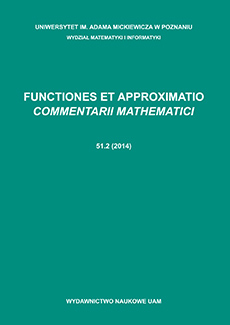Abstract
In this paper, we show that the only positive integer solutions of the equation $2^x=x^2+y^2-2$ are $(x,y)=(3,1),~(5,3),~(7,9)$. We propose also the following conjecture: the equation $2^x=y^2+z^2(x^2-2)$, where $y,z$ are odd positive integers and $x$ is a positive integer such that $x^2-2$ is a prime number, has the only solutions $(x,y,z)=(3,1,1),~(5,3,1),~(7,9,1),~(13,3,7)$. The conjecture implies a recent result of Lee [4] which states that if $x^2-2$ is an odd prime number such that the class number $h(x^2-2)$ of the quadratic field $\mathbb{Q}[{\sqrt{x^2-2}}]$ is $1$, then $x=3,5,7,13$.
Citation
Alexandru Gica. Florian Luca. "On the diophantine equation $2^x=x^2+y^2-2$." Funct. Approx. Comment. Math. 46 (1) 109 - 116, March 2012. https://doi.org/10.7169/facm/2012.46.1.8
Information





